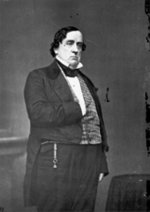Lewis Cass
|
|
Lewis_Cass_-_Election_Poster_circa_1848.jpg
Lewis Cass (October 9, 1782 – June 17, 1866) was an American military officer and politician. He was the nominee of the Democratic Party for president in 1848.
He was born in Exeter, New Hampshire where he attended Phillips Exeter Academy. During the War of 1812, he served as brigadier general. As a reward for his service in the war, he was appointed governor of the Michigan Territory by President James Madison on October 29, 1813 and served until 1831. He was frequently absent and several territorial secretaries often served as acting governor in his place.
In 1820 he led an expedition to the northern part of the territory, in the northern Great Lakes in present-day northern Minnesota, in order to map the region and discover the source of the Mississippi River. The source of the river had been unknown until then, resulting in an undefined border between the United States and Britain. The expedition erroneously identified Cass Lake as the source of the river. The source of the river was correctly identified in 1832 by Henry Schoolcraft, who had been Cass's expidition geologist, as nearby Lake Itasca.
On August 1, 1831, he resigned as governor of the Michigan Territory to take the post of Secretary of War under President Andrew Jackson, serving until 1836. From 1836 to 1842, he was ambassador to France.
Cass represented the State of Michigan in the United States Senate from 1845 to 1848. In 1848 he resigned from the Senate to run for president. Cass was a leading supporter of the Doctrine of Popular Sovereignty, which held that the people who lived in a territory should decide whether or not to permit slavery there. His nomination caused a split in the Democratic party, leading many antislavery Democrats to join the Free Soil Party.
After losing the election to Zachary Taylor, he returned to the Senate, serving from 1849 to 1857.
From 1857 to 1860 Cass served as Secretary of State under President James Buchanan. He resigned on December 13, 1860, reportedly disgusted by Buchanan's failure to pursue a stronger policy that might have averted the threatened secession of southern states. See: Origins of the American Civil War.
There are many places named after Cass, see List of places named for Lewis Cass.
| Preceded by: John Henry Eaton | United States Secretary of War 1831 – 1836 | Succeeded by: Joel Roberts Poinsett |
| Preceded by: James K. Polk | Democratic Party Presidential candidate 1848 (lost) | Succeeded by: Franklin Pierce |
| Preceded by: William L. Marcy | United States Secretary of State March 6, 1857 – December 14, 1860 | Succeeded by: Jeremiah S. Black |

